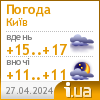Harvard Ukrainian Research Institute
Announces a Two-Day International Conference
The Great Famine in Ukraine:
The Holodomor and Its Consequences, 1933 to the Present
17-18 November 2008
The year 2008 marks the 75th anniversary of the Great Famine of 1932-1933, now often referred to by its Ukrainian name Holodomor (extermination by hunger). This man-made affliction ravaged, most devastatingly, Soviet Ukraine and the areas primarily settled by Ukrainians in the North Caucasus (the Kuban region) at the height of forced collectivization in the USSR.
Earlier projects at the Harvard Ukrainian Research Institute pioneered studies in the history of the Great Famine. It is the aim of this conference, however, to move beyond revisiting the background, course and analysis of the events of 1932-33. Instead, it aims to forge forward to investigate the momentous subsequent impact of the Holodomor in Ukraine, in a framework which will examine its short-, mid-, and long-term consequences that reach, indeed, to our own day.
We are pleased to invite you to the conference which will be held at the Harvard Faculty Club, 20 Quincy St., Cambridge.
For a full program with participants, on-line registration, travel information and information about related Famine events, please see HURI website: http://www.huri.harvard.edu/
The conference is open to the public and free of charge. However, seating is limited and pre-registration is strongly advised. You may register on-line or by calling HURI at 617-495-4053.
Concert: Premiere Performance of Selections from the Opera Red Earth (Hunger) by Virko Baley. Monday, November 17 at 8:00 p.m. at Swedenborg Chapel, 50 Quincy St., Cambridge, Massachusetts.
Conference Venue:
Harvard Faculty Club, 20 Quincy St., Cambridge, Massachusetts






